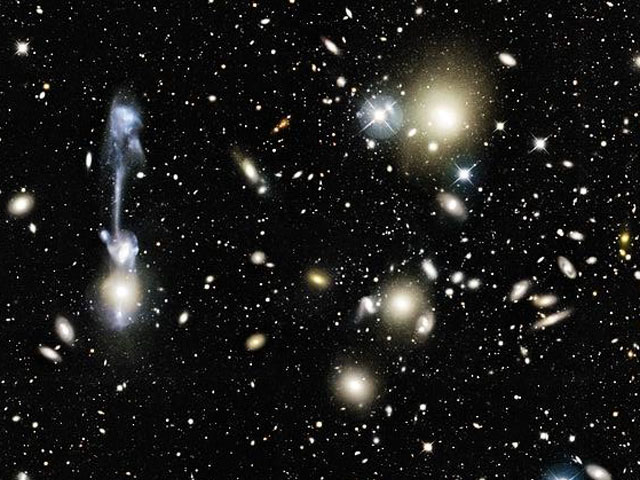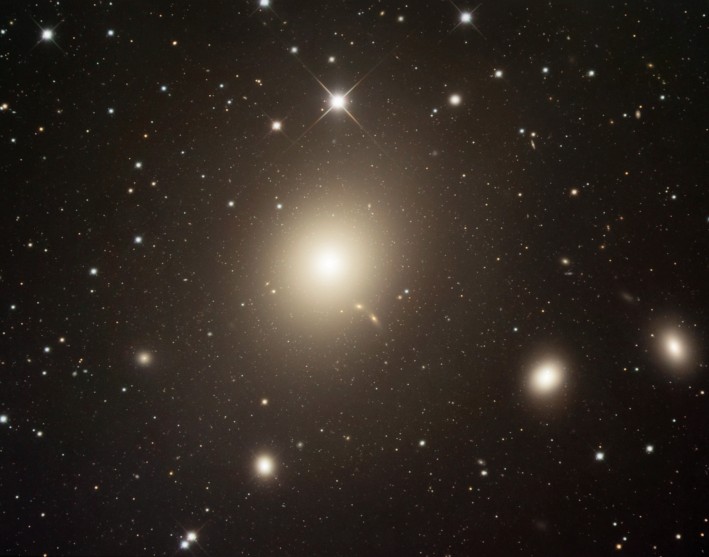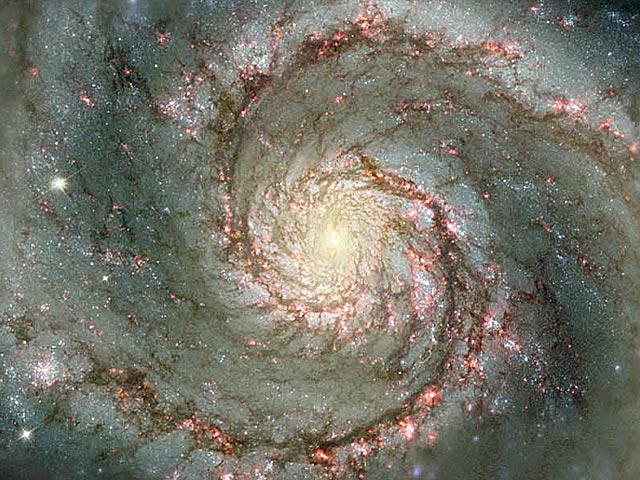The Heavens Declare His Glory (part 2)
Location, Location, Location
(Part 2 in a 4 part series)
Let's get back to this idea, premised in part 1, that we are not so special in God's mind because we are only an average world flung off in a remote corner of the universe.
 If we were really important, where would God place us? Perhaps right in the middle of the action, right at the center of some glamorous cosmic construction? (Of course, this all assumes that it is not God's intention to humble us, but I don't need to go down that road to make my points.) Let's walk through the universe and its possibilities.
If we were really important, where would God place us? Perhaps right in the middle of the action, right at the center of some glamorous cosmic construction? (Of course, this all assumes that it is not God's intention to humble us, but I don't need to go down that road to make my points.) Let's walk through the universe and its possibilities.Just what are the grandest structures in the universe in which God might place us? Well, galaxies are where the action is, but even these come in clusters. Maybe God should have placed us in one of those super clusters (like the nearby Perseus Cluster) containing thousands of galaxies. The bad thing about that is when you've got so many nearby massive neighbors, collisions and gravitational disturbances can result. And if one of those neighbors is a high-energy emitter, which is increasingly likely the more that you have, then it can be bad news for anything unshielded nearby.
 Okay, let's start with a safer little cluster of galaxies, like our own Local Group by the way. But at least God could put us in a nice, big, impressive galaxy. The biggest ones by far are the elliptical galaxies — giant ellipsoid (egg-like) masses of stars. But the problem with these galaxies is that they are generally the product of galactic collisions, and are made up primarily of older red giant stars, which are not good hosts for planets (more on that later). They have little free gas, dust, and heavy elements for planet making. Their stars are densely packed, which would be devastating to the orbits of any existing planets (this problem will be a recurring theme). And, so far as we know, they always contain one or more giant black holes at their core, which spray out some rather nasty particles and radiation whenever matter comes within proximity. All in all, an ill-suited place to be.
Okay, let's start with a safer little cluster of galaxies, like our own Local Group by the way. But at least God could put us in a nice, big, impressive galaxy. The biggest ones by far are the elliptical galaxies — giant ellipsoid (egg-like) masses of stars. But the problem with these galaxies is that they are generally the product of galactic collisions, and are made up primarily of older red giant stars, which are not good hosts for planets (more on that later). They have little free gas, dust, and heavy elements for planet making. Their stars are densely packed, which would be devastating to the orbits of any existing planets (this problem will be a recurring theme). And, so far as we know, they always contain one or more giant black holes at their core, which spray out some rather nasty particles and radiation whenever matter comes within proximity. All in all, an ill-suited place to be. Okay then, how about a nice big spiral galaxy? These are actually quite lovely and diverse places. While not as massive and star-packed as the giant ellipticals, they have a similarly dense nucleus and spiral arms. What about right in the center of one of these cosmic pinwheels? Well, unfortunately we've got similar gravitational and radiation problems as with the ellipticals in that large spiral galaxies tend to also contain super-massive black holes. Even the arms of the spirals are pretty dense, which increases the likelihood of gravitational interference with other stars and escalates the chances of crossing paths with a supernova or other nasty neighbors. And the problems are much the same for any of the massive star clusters that can be found throughout most galaxies.
Okay then, how about a nice big spiral galaxy? These are actually quite lovely and diverse places. While not as massive and star-packed as the giant ellipticals, they have a similarly dense nucleus and spiral arms. What about right in the center of one of these cosmic pinwheels? Well, unfortunately we've got similar gravitational and radiation problems as with the ellipticals in that large spiral galaxies tend to also contain super-massive black holes. Even the arms of the spirals are pretty dense, which increases the likelihood of gravitational interference with other stars and escalates the chances of crossing paths with a supernova or other nasty neighbors. And the problems are much the same for any of the massive star clusters that can be found throughout most galaxies. Another bad thing about densely star-packed areas is that even if you could manage to survive in such a region you wouldn't have the pleasure of seeing outside of the forest for all the trees (so to speak). That is to say, you wouldn't have a night sky, and you'd never witness the cosmos in certain electromagnetic wavelengths due to all the interference. In the spiral arms you'd have even more problems of this nature, since this is where you find most of the free-floating dust and gasses. While it might make for some interesting local effects, given the right illumination, in this region it's possible that you might not even be able to observe many of your stellar neighbors due to the obstruction.
Another bad thing about densely star-packed areas is that even if you could manage to survive in such a region you wouldn't have the pleasure of seeing outside of the forest for all the trees (so to speak). That is to say, you wouldn't have a night sky, and you'd never witness the cosmos in certain electromagnetic wavelengths due to all the interference. In the spiral arms you'd have even more problems of this nature, since this is where you find most of the free-floating dust and gasses. While it might make for some interesting local effects, given the right illumination, in this region it's possible that you might not even be able to observe many of your stellar neighbors due to the obstruction. So, just where is a good place to be? Well, as it turns out, spiral galaxies are not all bad. There are certain regions within them that are fairly cozy, and we don't have to go to the lonely fringe of the galaxy to find them. In fact, if God preferred the formation of our sun and planets from materials at hand, they would most readily be found nearer the central area. This is because you need a certain abundance of gases and stars to begin with, which are more sparse in the periphery, in order to facilitate the various rounds of star birth and death that manufacture the heavier elements. You see, the original material of the universe was primarily hydrogen, and (short of divine intervention) the heavier elements are only produced in the fusion engines we call stars and during their explosive death throws (i.e., novas and supernovas). Heavy elements — carbon, oxygen, silicon, iron, etc. — are important for planet forming and for imparting certain desirable characteristics to stars (and, or course, for life). It can take time to build up and release a significant amount of such materials, and this tends to happen in the galaxy from the inside out. All this boils down to a galactic habitable zone that falls somewhere between the inner core and the outer edge, yet not directly within the densely packed arms.
So, just where is a good place to be? Well, as it turns out, spiral galaxies are not all bad. There are certain regions within them that are fairly cozy, and we don't have to go to the lonely fringe of the galaxy to find them. In fact, if God preferred the formation of our sun and planets from materials at hand, they would most readily be found nearer the central area. This is because you need a certain abundance of gases and stars to begin with, which are more sparse in the periphery, in order to facilitate the various rounds of star birth and death that manufacture the heavier elements. You see, the original material of the universe was primarily hydrogen, and (short of divine intervention) the heavier elements are only produced in the fusion engines we call stars and during their explosive death throws (i.e., novas and supernovas). Heavy elements — carbon, oxygen, silicon, iron, etc. — are important for planet forming and for imparting certain desirable characteristics to stars (and, or course, for life). It can take time to build up and release a significant amount of such materials, and this tends to happen in the galaxy from the inside out. All this boils down to a galactic habitable zone that falls somewhere between the inner core and the outer edge, yet not directly within the densely packed arms.The bottom line is that the less populous space between the arms of the spirals is a perfect location for life, and, as an added bonus, would let the inhabitants have a clear view of both the nearby arm(s) of their own galaxy and an unobstructed view outside of the galaxy. And if that world were in a nice circular orbit near the corotation radius of the galaxy, then it would seldom risk crossing through the spiral arms. You'd also want an orbit that stayed well within the plane of the galaxy so as not to peek above or below the shielding dust of the inner rings and be exposed to the volatile output of the galactic core. Our own solar system happens to be situated in just such a place.
At this point it is worth mentioning that most of the stars in the universe happen to be locked up in hostile environments like elliptical galaxies, star clusters, galactic cores, and spiral arms. By comparison, the number of stars that are in the right kinds of positions within the right kinds of galaxies is miniscule. And even when we begin to look at stars that might be in prime real estate we find that very few of these make a friendly host.
But before I begin down the path of illustrating the kind of local variables required for life (e.g., stars and planets), let me just emphasize the fact that our world is in a very good place, being both safe and advantageous for viewing the action in the universe at large. Can the charge that we are no place special be sustained? Only if one could say that a babe cradled in his mother's arms looking safely through the window at his world is no place special. And even if there might be other mothers and other arms, it does not make his any less good.
Labels: Science



